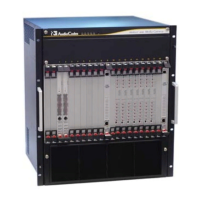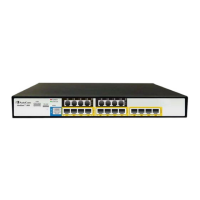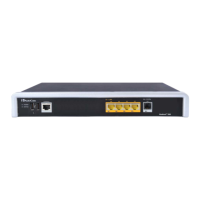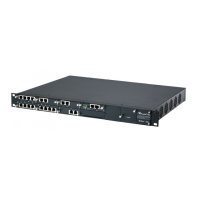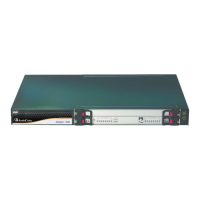CHAPTER34 Routing SBC
Mediant 800 Gateway & E-SBC | User's Manual
Parameter Description
■ To implement LCR and its Cost Groups, you must enable LCR
for the Routing Policy assigned to the routing rule (see
Configuring SBC Routing Policy Rules). If LCR is disabled, the
device ignores the parameter.
■ The Routing Policy also determines whether matched routing
rules that are not assigned Cost Groups are considered as a
higher or lower cost route compared to matching routing rules
that are assigned Cost Groups. For example, if the 'Default Call
Cost' parameter in the Routing Policy is configured to Lowest
Cost, even if the device locates matching routing rules that are
assigned Cost Groups, the first-matched routing rule without an
assigned Cost Group is considered as the lowest cost route and
thus, chosen as the preferred route.
'Routing Tag Name'
routing-tag-name
[IP2IPRouting_
RoutingTagName]
Defines the destination Dial Plan tag, which is used to determine the
destination IP Group.
The valid value is a string of up to 70 characters. Only one tag can
be configured. Only the tag name must be configured (not the value,
if exists). For example, if the tag is configured in the Dial Plan rule
as "Country=England", configure the parameter to "Country" only.
The tag is case insensitive.
The default value is "default", meaning that the device uses the first
tag name in the Dial Plan rule that is configured without a value. For
example, if the Dial Plan rule is configured with tags
"Country=England;City=London;Essex", the default tag is "Essex".
For more information on using tags to determine destination IP
Group, see Using Dial Plan Tags for Routing Destinations.
Note: The parameter is applicable only if the 'Destination Type'
parameter is configured to Destination Tag (see above).
'Internal Action'
internal-action
[IP2IPRouting_
InternalAction]
Defines a SIP response code (e.g., 200 OK) or a redirection
response (with an optional Contact field indicating to where the
sender must re-send the message) that the device sends to the
sender of the incoming SIP dialog (instead of sending the call to
another destination). The parameter is applicable only when the
'Destination Type' parameter in this table is configured to Internal
(see above).
The valid value syntax (case-insensitive) is:
■ For SIP response codes:
reply(response='<code>')
The following example sends a SIP 200:
reply(response='200')
■ For redirection responses:
redirect(response='<code>',contact='sip:'+….)
- 807 -

